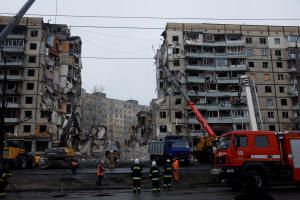Death toll in Russian missile strike in Ukraine rises to 40
 Send a link to a friend
Send a link to a friend
 [January 16, 2023]
By Herbert Villarraga and Tom Balmforth [January 16, 2023]
By Herbert Villarraga and Tom Balmforth
DNIPRO/KYIV, Ukraine (Reuters) -The death toll from a Russian missile
strike in the Ukrainian city of Dnipro rose to 40 on Monday with dozens
more missing, making it the deadliest civilian incident of Moscow's
three-month campaign of hurling missiles at cities far from the front.
Germany's Defence Minister Christine Lambrecht resigned on Monday after
remarks over the war criticised as tone deaf, setting the stage for what
is expected to be one of the most important weeks in outlining Western
military support for Kyiv.
With allies due to meet on Friday at a U.S. air base in Germany to
discuss military aid, Berlin is under intense pressure to allow exports
of its Leopard battle tanks, which Ukraine hopes will become the
backbone of a new armoured force.
Ukrainian officials acknowledged little hope of finding anyone else
alive in the rubble of Saturday's attack in Dnipro, but President
Volodymyr Zelenskiy said the rescue in the central Ukrainian city would
go on "as long as there is even the slightest chance to save lives".
"Dozens of people were rescued from the rubble, including six children.
We are fighting for every person!" Zelenskiy said in an overnight
televised address.

Moscow denies intentionally targeting civilians in a campaign of air
strikes since October that have knocked out power and water in Ukrainian
cities, and says the incident in Dnipro was caused by Ukrainian air
defences.
Kyiv says it has no way of shooting down the anti-ship missile it says
struck an apartment building in Dnipro on Saturday during Russia's
latest volley of attacks.
At least 40 people were killed in the attack with 30 still unaccounted
for, city official Gennadiy Korban said. He said 75 people were wounded
including 14 children.
TANK WEEK
The German government said Chancellor Olaf Scholz had accepted the
resignation of Lambrecht and would soon appoint a new defence minister
to replace her.
Her exit comes just three days before she was due to host her U.S.
counterpart, Defense Secretary Lloyd Austin, and four days before allies
gather at Ramstein air base in Germany for the next meeting to
coordinate military support for Kyiv.
Lambrecht had been criticised in recent days for tone deafness after an
upbeat New Year's Eve message filmed in front of fireworks, in which she
spoke of the opportunities she had to meet "interesting, great people"
as a result of the Ukraine war.
The coming week is expected to see intense diplomacy to secure
additional weapons for Kyiv, with the focus on Germany's reluctance so
far to supply tanks or let its allies send them.

[to top of second column]
|

Emergency personnel work at the site
where an apartment block was heavily damaged by a Russian missile
strike, amid Russia's attack on Ukraine, in Dnipro, Ukraine January
16, 2023. REUTERS/Clodagh Kilcoyne

France, the United States and Germany have all pledged armoured
fighting vehicles this month, but Western countries had so far
stopped short of offering main battle tanks. Britain broke that
taboo over the weekend by offering a squadron of Challengers.
Moscow has accused the West of escalating the conflict, although
Russia also says the supply of tanks would not affect the course of
the war. The British tanks "will burn like the rest", Kremlin
spokesman Dmitry Peskov said on Monday.
Eastern and central European NATO allies mainly rely on German-built
Leopards, seen as the Western tanks most suited to forming the core
of a new Ukrainian armoured force. Poland and Finland said last week
they would like to send them, but that requires Berlin's permission.
Ukrainian forces recaptured swathes of territory during the second
half of 2022. But the front lines have largely been frozen in place
for the past two months, despite intense fighting in which both
sides are believed to have taken heavy losses. Kyiv says new Western
armour would break the stalemate, giving its forces the capability
to break through Russian defensive lines.
Moscow claimed to have captured the eastern salt-mining town of
Soledar last week, in what would be its biggest battlefield success
since last August. Kyiv says it still has some presence in the town
and fighting continues.
"Put simply, THE BATTLE CONTINUES," Deputy Defence Minister Hanna
Maliar said on the Telegram messaging app. "Everything else is
unverified information."
Ukraine's Western allies say the fight for Soledar, with a pre-war
population of barely 10,000, is unlikely to have much wider impact,
except insofar as the huge losses there could sap manpower both
sides need for decisive battles that lie ahead.

Ukraine has been warning that Moscow could be planning a new assault
in coming weeks, including from close ally Belarus, which has
allowed Russia to use its territory as a staging ground but has so
far resisted joining the war directly.
Russia and Belarus began joint military aviation exercises on
Monday. Minsk said the drills are defensive and it will not enter
the war.
"We're maintaining restraint and patience, keeping our gunpowder
dry," said Pavel Muraveyko, first deputy state secretary of
Belarusian Security Council, according to a post on the Belarusian
defence ministry's Telegram app on Sunday.
(Additional reporting by Lidia Kelly and Dan PeleschukWriting by
Peter Graff; Editing by Frank Jack Daniel)
[© 2023 Thomson Reuters. All rights
reserved.]This material may not be published,
broadcast, rewritten or redistributed.
Thompson Reuters is solely responsible for this content. |